How To Stop Coughing – 26 Home Remedies That Can Help
Clear your congested airways effortlessly with these effective natural solutions.

Image: Shutterstock
A cough can be irritating at any time of day or night. It disrupts your daily routine and the precious hours of sleep you get at night. Thankfully though, you don’t need to rush to the pharmacy in the wee hours of the morning if you know how to stop coughing without medicine.
Yes, it’s not very challenging to get rid of a cough unless it is from a serious medical condition or a complication of an ailment you have. But, even then, using effective home remedies and applying them as directed may significantly reduce the cough’s severity.
Coughing may wreak havoc on your body and mind, regardless of your age or gender. Unfortunately, we are all plagued and afflicted by this very prevalent condition at some point in our lives. So, what exactly is cough, and why does it occur? Scroll down to know this and more!
A study conducted on 74,977 participants, 3,654 people had experienced chronic cough in the past 12 months. The prevalence of chronic cough was found to be more in females and older respondents, which affected the overall quality of life with increased anxiety and depression in the last 2 weeks.
In This Article
What Causes A Cough?
There are many reasons for a cough. Here are the most common causes:
- Respiratory tract infection (RTI) – cold, pneumonia, flu, bronchitisi Inflammation of the lining of bronchial tubes (that carry air to and from the lungs) that may cause coughing and shortness of breath. , and sinusitisi A condition that causes inflammation of the cavities around the nasal passages, which is generally triggered by colds or allergies.
- Asthma
- Gastroesophageal reflux disease (GERD)
- Pertussis (Whooping Cough/Diptheria)
- Tuberculosis
- Foreign body
- Dry mouth
- Swallowing difficulties
- Angiotensin-converting enzyme inhibitors (Drugs used for diabetes and high blood pressure)
- Lung tumors
- Allergies
- Pollution-related pathogens (1, 2)
The signs and symptoms of cough are given below.
Cough Symptoms
Other symptoms that often accompany a cough are:
- Cold
- High temperature
- Chills
- Chest pain
- Headache
- Fatigue
- Difficulty in breathing
- Blocked nose
- Disrupted sleep (1, 2)
When the cough does not last for long, it is usually a temporary and non-serious issue. Recurring or incessant cough can mean serious health issues, hence categorizing cough and identifying the type you are stricken with is essential. These types are given below.
Types Of Cough
Cough can be categorized as:
- Acute Cough – when it occurs for less than 3 weeks
- Chronic Cough – when it continues for more than 8 weeks (in which case, stop reading this and go see a doctor!)
- Subacute Cough – lasts anywhere between 3 and 8 weeks
- Productive Cough – if you cough up sputum
- Dry or Nonproductive Cough – if there is no expulsion of sputum
- Nocturnal Cough – occurs only at night (3, 4)
As we already saw, the reasons behind a cough are numerous – some are very simple and clear up easily with antibiotics and a lot of TLC, while others may be serious and require long-term treatment and, possibly, hospitalization.
 Quick Tip
Quick TipWhen the causes are common, such as respiratory infections, you can bid goodbye to the resultant cough with the following remedies.
How To Stop Coughing Using Home Remedies
The 26 simple home remedies discussed below help ease coughing naturally, without the use of medications. These remedies use everyday ingredients and are easy to make:
- Essential Oils
- Pineapple Juice
- Honey And Lemon
- Honey And Cinnamon
- Ginger, Peppermint, And Honey
- Apple Cider Vinegar
- Vicks On Feet
- Tea
- Elderberry
- Raw Onion On Feet
- Buckwheat Honey
- Thyme
- Salt Water Gargle
- Turmeric Milk
- Black Pepper
- Baking Soda
- Basil
- Lemongrass
- Soup
- Fenugreek
- Grapes
- Guava Leaves
- Garlic
- Jaggery
- Almonds
- Carrot Juice
Natural Remedies For Cough
1. Essential Oils For Cough
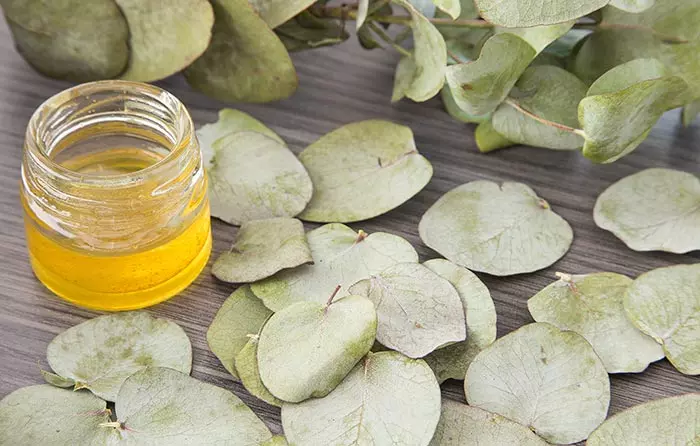
You Will Need
A few drops of eucalyptus oil or tea tree oil or thieves oil
What You Have To Do
Rub the essential oil of your choice on your neck and sinuses. You can also apply a drop or two on the chest.
How Often You Should Do This
Repeat this twice a day, especially before going to bed.
Why This Works
Eucalyptus oil is an expectorant, and its antibacterial action will relieve cough, headache, body ache, and a blocked nose in no time
(5). Tea tree oil is a multipurpose antimicrobial agent that can treat the infection (6). Thieves oil, on the other hand, has more beneficial properties as it is a blend of lemon, cinnamon bark, clove, rosemary, and eucalyptus essential oils. This combination works as an expectorant, an antimicrobial, and an anti-inflammatory agent that can give relief to your throat (7).
2. Pineapple Juice For Cough
You Will Need
- 1 cup pineapple juice
- 1 1/2 tablespoons honey
- A pinch of salt
- A pinch of black pepper powder
What You Have To Do
- Mix the honey and spices with the pineapple juice.
- Drink one-fourth cup of this.
- Store the rest in the refrigerator.
How Often You Should Do This
Drink this thrice a day.
Why This Works
The bromelain present in pineapple juice reduces cough, inflammation in the respiratory tract, and nasal mucus (8).
3. Honey And Lemon For Cough
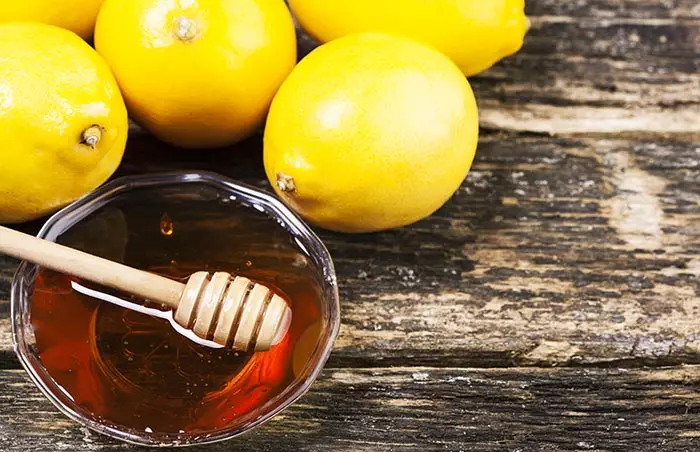
You Will Need
- 2 tablespoons honey
- 1/2 teaspoon lemon juice
- A cup of hot water
What You Have To Do
- Add the honey to hot water and mix well.
- Add the lemon juice and stir well. Drink this concoction.
How Often You Should Do This
Have this mixture once in the morning and once at night.
Why This Works
Honey is a gentle yet effective cough reliever.
It is a demulcenti A mucilaginous preparation that forms a soothing protective film over the mucous membranes and protects them from further irritation. and has soothing properties that can relieve incessant coughing in an instant (9). The vitamin C in lemon juice aids quick recovery from the infection (10). You can give honey and lemon for coughs to children as well.
4. Honey And Cinnamon For Cough
You Will Need
- 1 tablespoon honey
- A pinch of cinnamon powder
What You Have To Do
- Heat the honey till it becomes slightly runny and add the cinnamon powder to it. Mix it well.
- Once the mixture cools down, ingest it.
How Often You Should Do This
Use this yummy cough syrup 2-3 times during the day to keep the cough under control.
Why This Works
Cinnamon, in combination with honey, is a magic potion for coughs that won’t go away.
It clears the sinuses and soothes the inflamed respiratory passages (11). This mixture is absolutely safe for children, and they love the flavor too.
5. Ginger, Peppermint, And Honey For Cough
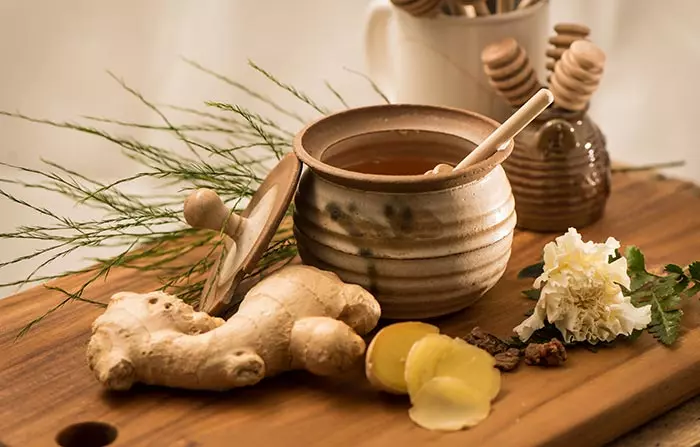
You Will Need
- 3 tablespoons chopped ginger
- 1 tablespoon dried peppermint
- 1 cup honey
- 4 cups water
What You Have To Do
- Take the water in a pan and add the ginger and peppermint to it.
- Boil this mixture until it reduces to half of its original volume.
- Let it cool down. Add the honey to it and mix well.
- Take a tablespoon of this herbal blend.
The rest of the mixture can be stored in an airtight container in the refrigerator for about three weeks.
How Often You Should Do This
Have this herbal remedy once in every 3-4 hours.
Why This Works
Ginger has strong antibiotic properties. If taken with honey, it works as a natural painkiller and cough reliever at any time of the day (12). Peppermint helps ginger in eliminating the infection as it is also an antimicrobial agent. It also soothes the sinus passages and the itching sensation in your throat (13). Drinking ginger tea also soothes throat irritation caused by coughing.
6. Apple Cider Vinegar For Cough
You Will Need
- 2 tablespoons apple cider vinegar
- A glass of warm water
What You Have To Do
- Add the vinegar to the water and gargle with this.
- Do not ingest this liquid.
A teaspoon of ACV mixed with two teaspoons of honey can be ingested for added relief from cough.
How Often You Should Do This
Gargle with this once or twice every day.
Why This Works
Apple cider vinegar and its benefits are just never-ending. It can be used to soothe an adamant cough (14). Its antimicrobial and pH balancing properties work in our favor when it comes to treating a cough. If you do not have any ACV at home, you can use white vinegar or red vinegar instead.
Note
If the taste of the vinegar puts you off, you can add some lime juice or salt to make it bearable.
7. Vicks On Feet For Cough
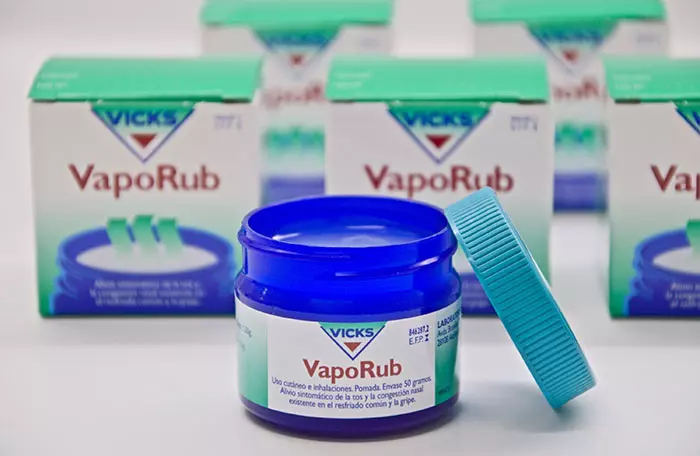
You Will Need
- Vicks vaporub
- Socks
What You Have To Do
Apply Vicks on the soles of your feet and cover them with socks.
How Often You Should Do This
Do this every night before going to bed.
Why This Works
This remedy came to light in 2015 when every newspaper started featuring it for its wonderful cough alleviating effects. The vaporub is said to sensitize the nerves going from your feet to your spinal cord and interrupt the cough cycle. Please keep in mind that this remedy is only a temporary fix to stop the coughing and will not treat the cough.
8. Tea For Cough
You Will Need
- 1 tablespoon oregano tea OR licorice root tea OR hibiscus tea (or a tea bag)
- A cup of boiling water
What You Have To Do
- Brew some fresh herbal tea with the herb you have available at home by soaking it in hot water for a few minutes.
- Strain and sip on this tea.
How Often You Should Do This
Have 2-3 cups of herbal tea every day until the cough goes away.
Why This Works
Herbal tea is among the top herbal remedies for cough. Sip on refreshing herbal teas and say goodbye to that cough. Oregano contains thymol that helps to loosen the phlegm and mucus blocking your nasal passages, giving relief from the coughing (15). Licorice root has anti-inflammatory properties that also aid in clearing up your sinus passages (16). Hibiscus tea is rich in vitamin C, which is an essential vitamin required when the body is trying to fight the respiratory infection and recover (17).
9. Elderberry For Cough
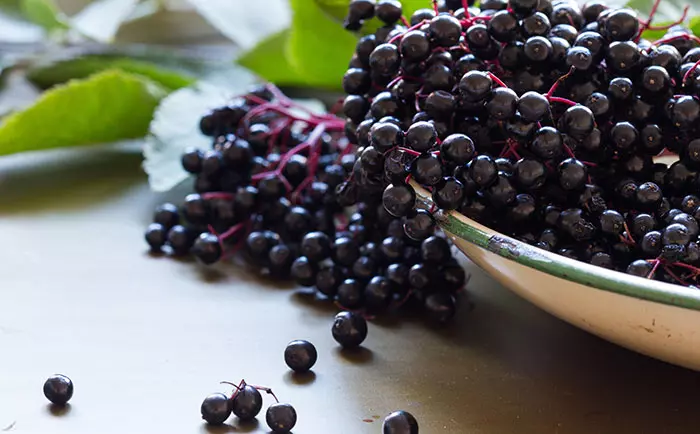
You Will Need
- 2-3 cups dried black elderberries
- 2 tablespoons ginger root (fresh or dried)
- 1 teaspoon cinnamon powder
- 1/2 teaspoon cloves
- 1 cup raw honey
- 3 1/2 cups water
What You Have To Do
- Add all the ingredients to the water except the honey.
- Heat this up for 30-40 minutes until it reduces to half.
- Remove the mixture from the flame and mash the berries thoroughly.
- Strain this once cooled and then add the honey to it. Mix well.
- Take about one tablespoon of this syrup.
- Store the remaining syrup in a glass jar in a cold place.
How Often You Should Do This
Take this every 3-4 hours until the cough subsides.
Why This Works
Elderberry is often used to boost immune functions and fight against viral infections like the flu, which can cause cough apart from the other symptoms (18).
10. Raw Onion On Feet For Cough
You Will Need
- Onion slices (white or red)
- Socks
What You Have To Do
- Place the slices on under your feet and cover them with socks.
- Go to bed as usual.
How Often You Should Do This
Repeat this for a night or two, and you will see the difference for yourself.
Why This Works
Onions are known to absorb impurities from their surroundings and kill any germs present in their vicinity. They also emit phosphoric acid gas, which enters the bloodstream and purifies the blood. The purification helps to kill the cough-causing virus/bacteria (19).
11. Buckwheat Honey For Cough
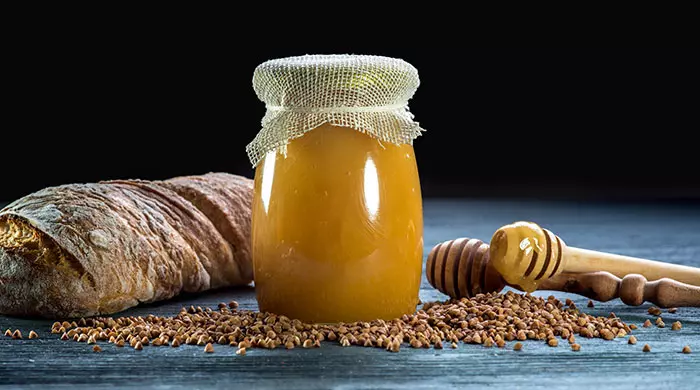
You Will Need
Buckwheat honey
What You Have To Do
Take half to one tablespoon of this before going to bed.
How Often You Should Do This
Do this daily until the cough goes away.
Why This Works
Buckwheat honey has antioxidant, anti-inflammatory, and antibacterial properties (20). It also soothes the irritation in the throat and prevents coughing while sleeping.
Caution
Kids whose age is lesser than a year should not be given honey as it can cause botulism. If you are unsure about using this honey remedy for your toddler, consult your physician first.
12. Thyme For Cough
You Will Need
- 1 teaspoon thyme leaves
- A cup of water
What You Have To Do
- Boil the thyme leaves in water for a few minutes until the water reduces to half the amount.
- Sip this liquid.
How Often You Should Do This
Have this liquid once or twice a day.
Why This Works
This beautiful, delicate herb can solve your cough troubles. Thyme has antimicrobial properties that treat the infection causing the cough. It is also mildly sedative in nature and can help reduce any throat pain caused by the cough (21). You will experience an instant soothing relief when you drink this herbal tea.
13. Salt Water Gargle For Cough
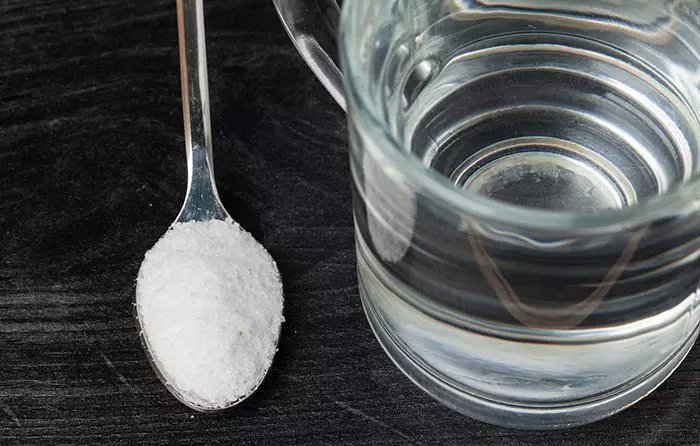
You Will Need
- 1 teaspoon common salt
- A glass of warm water
What You Have To Do
Mix the salt in the water and gargle with the liquid.
How Often You Should Do This
Repeat this twice or thrice a day.
Why This Works
Sodium chloride or common salt works effectively against cough and throat pain when used for gargling. It provides hydration to the throat, acts as an antibacterial agent, and soothes the pain. Doing saltwater gargle once every few days on a regular basis can help prevent throat and upper respiratory tract infections in the future (22).
Caution
Don’t ingest this water as salty water can induce vomiting.
14. Turmeric Milk For Cough
You Will Need
- A glass of almond, coconut, or rice milk
- 1 teaspoon turmeric powder
What You Have To Do
- Add the turmeric to the milk and mix well.
- Drink this.
If you find the taste too appalling, you can sweeten the milk with some sugar or honey.
How Often You Should Do This
Have a glass of this turmeric-infused milk every day until the cough goes away.
Why This Works
Warm milk or, for that matter, any warm liquid helps in relieving a cough by hydrating the dry, raspy throat. It also acts as a nasal decongestant and helps in the expulsion of sputum. Turmeric, with its amazing healing and antibacterial qualities, will go a long way in curing a nasty cough (23).
15. Black Pepper
You Will Need
- 1 teaspoon ground black pepper (preferably freshly ground)
- 2 tablespoons honey
- A cup of hot water
What You Have To Do
- To the hot water, add the black pepper powder and honey.
- Cover the cup and let this steep for 10-15 minutes.
- Drink this tea.
How Often You Should Do This
Drink 1-2 cups every day.
Why This Works
It sounds like a dangerous way to cure a cough, but black pepper is very effective when taken with honey. Sure, it will sting, but your cough will vanish for hours. This is because black pepper is a natural cough suppressant and chest decongestant (24).
16. Baking Soda For Cough
You Will Need
- 1 tablespoon baking soda
- 1/2 cup maple syrup
What You Have To Do
- Add the baking soda to the maple syrup and mix well.
- Take a tablespoon of this mixture.
How Often You Should Do This
Whenever you feel a bout of cough is about to begin, take this syrup.
Why This Works
The maple syrup will soothe the throat irritation, and the baking soda will help to eliminate the infection with its antibacterial properties (25).
17. Basil
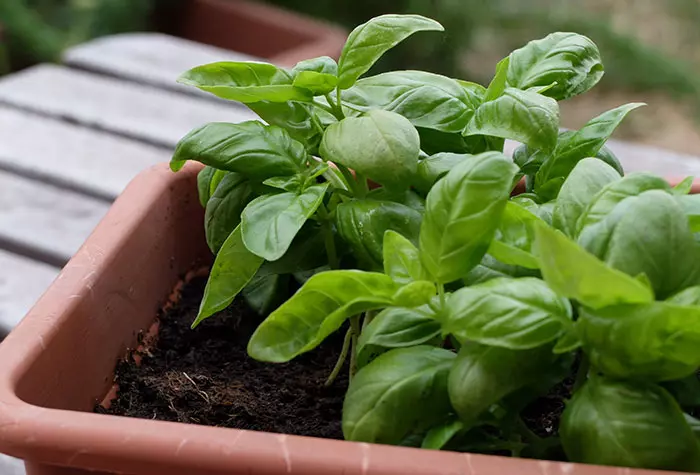
You Will Need
A few basil leaves
What You Have To Do
Wash the leaves and chew them. If the taste is too strong, you may add a pinch of salt and/or some black pepper.
How Often You Should Do This
Chew on basil leaves 2-3 times in the day.
Why This Works
Basil leaves have marvellous healing qualities. They are antimicrobial and analgesic and can relieve pain. Their anti-inflammatory, antioxidant, and immunomodulatoryi Drugs that modulate the response of the immune system and help treat autoimmune conditions like rheumatoid arthritis. properties will aid quick recovery from the cough (26).
18. Lemongrass For Cough
You Will Need
- 1-2 lemongrass leaves
- A cup of hot water
What You Have To Do
- Cut the leaves into 1-inch pieces and add them to the cup of hot water.
- Steep this for 10-15 minutes.
- Strain and drink the tea.
For additional flavor, you can add a small piece of ginger to the tea.
How Often You Should Do This
Have two cups of lemongrass tea every day to get rid of cough without medicines.
Why This Works
This pretty little fragrant herb has a natural summery aroma. It is used to treat cough, cold, and fever because of its germ-killing and mild astringent properties (27). It may also alleviate any pain caused by the cough.
19. Soup For Cough

You Will Need
- 1 1/2 cups chicken bone broth (or vegetable broth)
- 1/4 cup cooked shredded chicken
- 1/2 cup cooked rice noodles (optional)
- 1-2 tablespoons soy sauce
- 1 tablespoon sliced scallion
- 1/2-1 teaspoon grated ginger
- 1/2 teaspoon sesame seeds
- Salt to taste
- Black pepper powder to taste
What You Have To Do
- Add all the ingredients to a pan and simmer for a minute or two to heat up the broth.
- Remove from the flame and sip on this healthy herbal soup.
How Often You Should Do This
Have a bowl of this once or twice a day.
Why This Works
The hot soup will decongest your chest and get rid of the cough. The herbs and spices aid in the decongestion and also act as antimicrobial agents against the microorganisms that are causing the throat infection.
20. Fenugreek For Cough
You Will Need
- 2 tablespoons fenugreek seeds
- 3 teaspoons dried thyme
- 3 teaspoons dried oregano
- 5 tablespoons extra virgin olive oil
- A cup of honey
- Juice of one lemon
- 3 cloves
- 2 cups warm water
What You Have To Do
- Clean the fenugreek seeds and grind them to get a powder.
- Add this powder to the warm water along with the thyme, cloves, and oregano. Let this sit for about 15 minutes.
- In the meantime, on a low flame, mix the honey and olive oil in a pan. Continue mixing until the honey has combined with the oil.
- Now, strain the herbal tea prepared and add it to the honey-oil mix.
- Keep stirring until a homogenous mixture is formed.
- Finally, add the lemon juice and give the syrup a final stir.
- Remove from the flame and let it cool.
- Ingest a tablespoon of this syrup.
Store the rest of the herbal fenugreek syrup in a mason jar in the refrigerator. This is good to use for about two months.
How Often You Should Do This
Take this syrup 2-3 times during the day whenever you have a cough.
Why This Works
Fenugreek soothes a sore throat and gives relief from cough with its antimicrobial, anti-inflammatory, and analgesic properties (28).
21. Grapes For Cough

You Will Need
- 1 cup grape juice
- 1 teaspoon honey
What You Have To Do
Mix the honey with grape juice and drink this.
How Often You Should Do This
Do this once every day.
Why This Works
Grapes act as expectorantsi Chemicals that help thin and loosen the mucus and help clear phlegm from the respiratory tract. and decongest the lungs (29).
22. Guava Leaves For Cough
You Will Need
- 2-3 guava leaves
- A glass of water
What You Have To Do
- Boil the leaves for a few minutes to prepare a decoction.
- Strain and drink the tea prepared.
How Often You Should Do This
Drink a cup of guava leaf tea every day until you get relief from the cough.
Why This Works
Guava leaves have antibiotic properties and are rich in vitamin C. Drinking tea made with these leaves can get rid of the cough by killing the microbes and boosting immunity (30).
23. Garlic
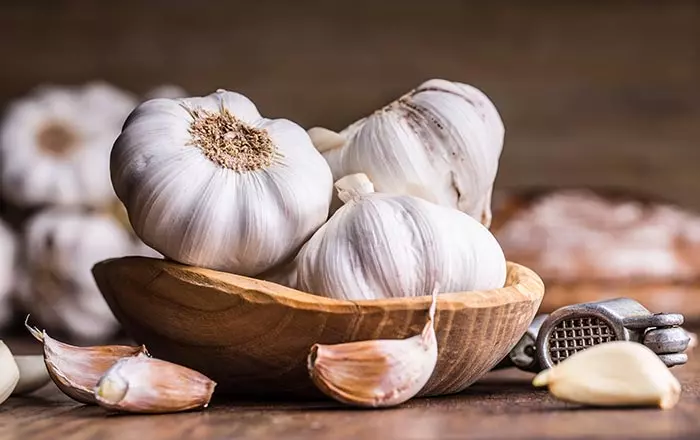
You Will Need
- 1-2 garlic cloves
- A glass of milk
What You Have To Do
Boil the garlic cloves in milk and drink it.
How Often You Should Do This
Drink a glass of this milk every night for 2-3 days, and you will definitely notice a difference.
Why This Works
It tastes and sounds horrible, but you can get back to your normal routine soon as this remedy will relieve even the worst of coughs. Garlic has very strong antibacterial and pain-relieving qualities that bid goodbye to your cough with ease (31).
24. Jaggery For Cough
You Will Need
A small piece of jaggery
What You Have To Do
Keep the jaggery piece in your mouth and suck on it.
How Often You Should Do This
Use this remedy whenever you start coughing.
Why This Works
The jaggery juice will soothe the irritated throat during a bout of cough.
25. Almonds For Cough
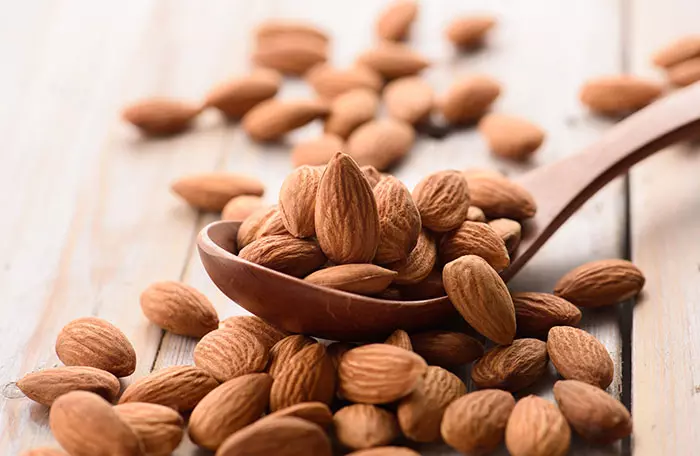
You Will Need
- 7-8 almonds
- A cup of orange juice
What You Have To Do
- Grind the almonds to get a fine powder.
- Blend this with the orange juice and sip on it.
How Often You Should Do This
Use this as and when required to get the cough under control.
Why This Works
Strange as it may seem, powdered or crushed almonds, added to some orange juice, can be the perfect home remedy for cough. The taste of the mixture is very refreshing and soothing as almonds have natural immune-boosting properties (32). This remedy is recommended for dry cough.
26. Carrot Juice
You Will Need
A cup of carrot juice
What You Have To Do
Drink this in between meals.
How Often You Should Do This
Have 2-3 cups in a day.
Why This Works
Carrot contains strong antioxidants and phytochemicals that promote health (33). Its juice can aid your body in fighting the throat infection better and help in getting rid of the cough easily.
If your cough is non-serious, these are some simple home remedies that you could try. They are easy to use and can be made from everyday kitchen ingredients. So, before you visit the pharmacy to buy prescription medication or try over-the-counter remedies, try them. You will be rid of that cough and spring back on your feet in no time. Most of these tips work equally well for children, though it is best to consult your pediatrician before you try them on your child for the first time.
Dry and wet cough are the two main types of cough for which you may need home remedies. Learn more about them in the next section.
Dry Cough Vs. Wet Cough
Dry or non-productive cough does not produce mucus or phlegm. It usually occurs due to irritation or inflammation of the upper respiratory tract caused by viral infections, such as flu, allergies, and exposure to irritants like dust. It may also be linked to asthma (34).
On the other hand, a wet or productive cough leads to the production of mucus or phlegm. Its causes may include the common cold, bronchitis, pneumonia, and chronic pulmonary disease (35).
Anecdotal evidence suggests that home remedies for both types of cough often overlap. However, if you experience persistent dry or wet cough, it is best to consult with a healthcare provider for appropriate treatment and management.
Tasneem H Yousuff, a blogger, recounted her experience of using cloves to treat her cough. She said, “I did not chew or suck on them, merely they remained on one side of my mouth. Surprisingly, the coughing stopped in a short while! I have continued with the cloves, especially before going to bed, and have been enjoying complete relief from the cough and enjoying a good night’s sleep (i).”
Here is a list of food items that are best avoided when you have cough.
Foods To Avoid
- Dairy and dairy products
- Caffeinated drinks like coffee, fizzy drinks, etc.
- Common allergens found in shellfish, yeast, nuts, eggs, soy, and other items
- Processed foods, such as chips and packaged snacks
- White bread and white pasta
- Spicy and fried food
Avoid them as much as possible for fast recovery from cough.
 Quick Tip
Quick TipBesides, you may also follow a few other tips to help prevent cough. Scroll down to know more.
Tips To Prevent Coughing
- Wash your hands frequently to reduce the transfer of germs.
- Avoid close contact with people who are sick.
- Stay hydrated by drinking plenty of fluids.
- Keep your home humidified to ease throat irritation.
- Avoid smoking and secondhand smoke to prevent irritation the respiratory tract.
- Use a tissue or your elbow to cover your mouth when coughing or sneezing.
- Make sure to get vaccinated against the flu and other respiratory illnesses.
- Ensure you limit exposure to allergens like dust and pollen.
These tips can help prevent getting a cough but there is something more you need to consider – the risk factors. Keep reading and understand them in the next section.
Risk Factors
A cough can easily progress to chronic cough in the presence of certain risk factors. These are:
- Smoking
- Vulnerability to allergies
- Presence of environmental irritants or pollutants
- Female gender
- Chronic lung diseases, such as COPDi Called chronic obstructive pulmonary disorder, an inflammatory disease that blocks airflow from the lungs and makes breathing difficult. , asthma, and previous lung infections
In cases the cough becomes unmanageable or seems to worsen, you must consult a doctor. Keep reading to learn more about it.
When To Seek Medical Help
Seek medical help for a cough if it lasts longer than a few weeks, gets worse over time, or is accompanied by other symptoms like a high fever, shortness of breath, chest pain, or coughing up blood. A cough that disrupts your sleep, causes wheezing or comes with unexplained weight loss should also be checked by a doctor. If you have a persistent cough and underlying health conditions like asthma or heart disease, it is important to get medical advice sooner.
Infographic: Top 6 Home Remedies For Coughing
Coughing can disrupt your daily routine and sleep. However, while constant coughing can be a sign of an allergic reaction or an underlying medical issue, seasonal coughs can be treated at home using simple remedies. Check out the infographic below to discover some home remedies you can try at home to treat your cough.

Illustration: StyleCraze Design Team
You may have a cough due to various reasons like a respiratory tract infection, acid reflux, asthma, dry mouth, allergies, or a foreign body in your airways. Depending on the cause, frequency, associated symptoms, and duration, cough can be categorized into different types such as nocturnal, acute, chronic, productive, etc. To find out about how to get rid of a cough in 5 minutes, you first need to understand what kind of cough you have. Common home remedies for cough include aromatherapy using essential oils, drinks made from fruit juices, herbal teas, and the application of spices. Even avoiding irritants that irritate your throat will help relieve your cough. Avoiding smoking is another way to soothe an irritated throat. Additionally, you can tweak your diet a little to exclude processed foods, dairy products, and caffeine for added relief.
Below are some more cough related questions answered for you.
Frequently Asked Questions
How to prevent coughing?
You can use remedies like the herbal teas, soups, and syrups mentioned above to prevent coughing.
Why does my cough get worse at night?
When we lie down, the mucus pools at the back of the throat, causing us to cough more at night.
What is the best position to sleep with a cough?
A simple way to prevent coughing at night is to prop your pillow a little higher than usual and sleep at an incline. You can also try sleeping sideways.
What to give a toddler for cough?
Using honey is a wonderful way to relieve cough in toddlers. However, check with your doctor first.
Why does your head hurt when you cough?
The jerks created by coughing can put pressure on the chest, neck, and head, leading to a headache.
Why do I get a cough after running/exercise?
The physical activity increases your heart rate and slightly constricts your airway passages. This causes a cough.
How long does a cough last?
A cough can last for up to 18-20 days.
Why do I cough after I eat?
Acid reflux after eating can irritate your air passages and cause a coughing fit.
Why do I cough when the air is cold?
The cold air dries up your airways, and coughing and wheezing are indirect responses of the body.
What can cause a persistent cough?
Asthma, GERD, and chronic bronchitis are often associated with a persistent cough.
What does it mean when you cough up blood?
Coughing up blood can indicate problems with your blood vessels, serious infections, and even cancer. Consult a specialist immediately in such cases.
When to see a doctor for a cough?
See a doctor if the cough hasn’t gone away after several weeks. Also, if you notice any of these symptoms:
Wheezing
Coughing up greenish-yellow phlegm
Accompanied fever of above 100oF
Shortness of breath
Coughing up blood
Is it safe to take cough medicine during pregnancy?
Most OTC medicines for cough are safe for consumption during pregnancy. If you are still in the first 12 weeks of pregnancy or even otherwise, it is always best to speak to your doctor for the recommended medication.
What is better for relieving cough – hot or cold water?
Hot water is better for cough as it may relieve sore throat and congestion and help keep your body warm.
Does ice cream make a cough worse?
Ice cream may worsen cough and cold symptoms. Consuming anything cold may cause dryness in the throat, leading to itching and cough.
Even though some of the remedies we have listed may seem a little unappealing, they do work. Give them a try and see for yourself. They have been tested by many people around the world and their benefits have been approved by specialists.
Find the one that clicks for you and remember to spread the word. Don’t forget to share your experience with us in the comments section below.
Key Takeaways
- Rub a few drops of Thieves oil on your nose, chest, and sinuses to get relief from acute cough.
- Honey’s demulcent properties and lemon’s vitamin C content can help with cough symptoms.
- Salt water gargling can ease throat pain and prevent respiratory tract infections.
- In case of chronic cough that lasts more than 8 weeks, it is better to consult a doctor than rely on home remedies.
Illustration: How To Stop Coughing - 26 Home Remedies That Can Help

Image: Dall·E/StyleCraze Design Team
Learn more about simple home remedies to relieve cough and associated symptoms. Watch this video to discover natural treatments to soothe your throat.
Personal Experience: Source
StyleCraze's articles are interwoven with authentic personal narratives that provide depth and resonance to our content. Below are the sources of the personal accounts referenced in this article.
i. Cloves — The Powerful Spice That Cleared My Coughhttps://medium.com/change-your-mind/cloves-the-powerful-spice-that-cleared-my-cough-1915a6f16abd
Read full bio of Dr. Abby Kramer
Read full bio of Kushneet Kukreja
Read full bio of Arshiya Syeda
Read full bio of Dipti Sharma





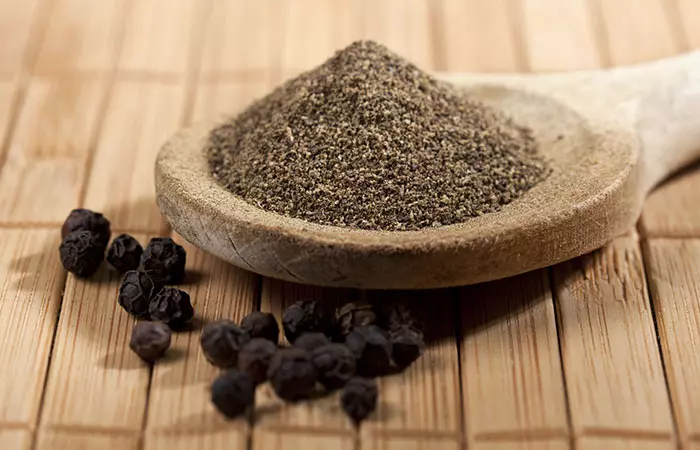
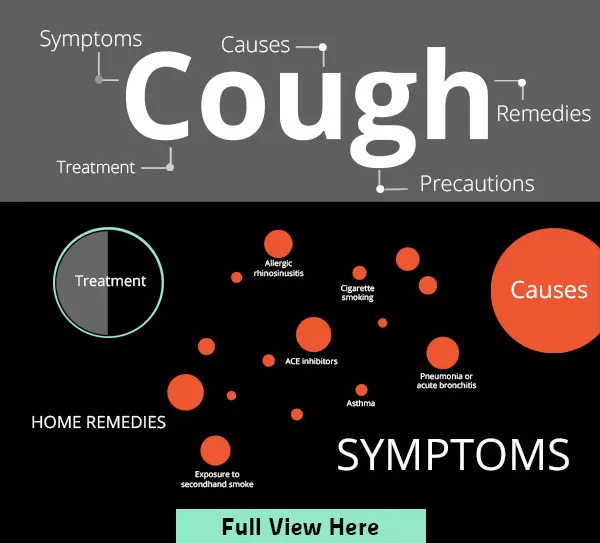

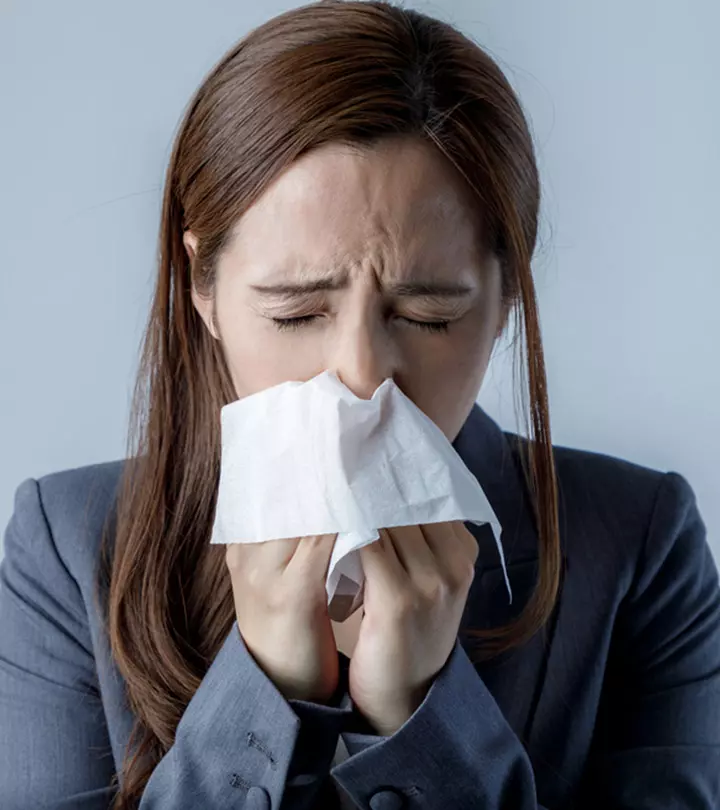




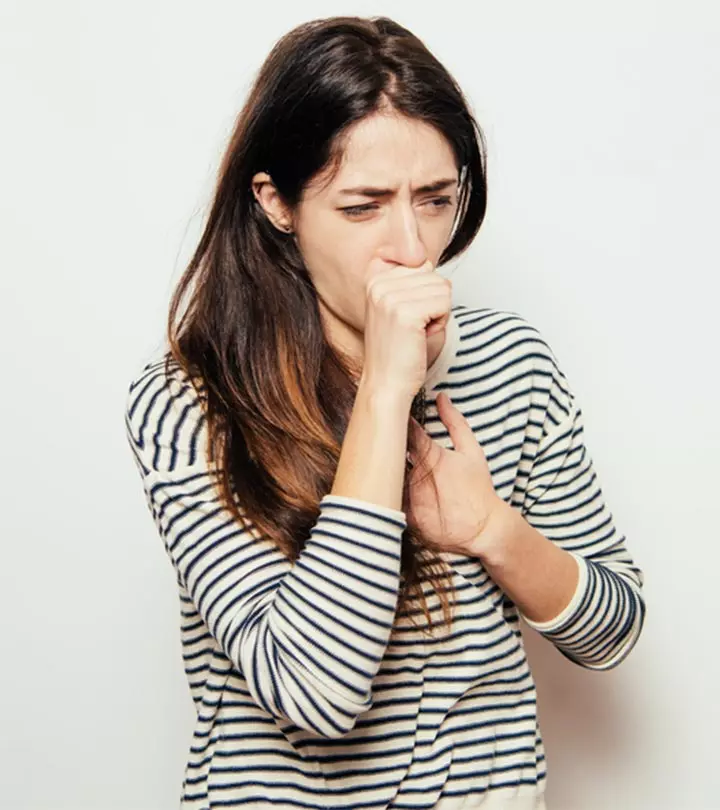
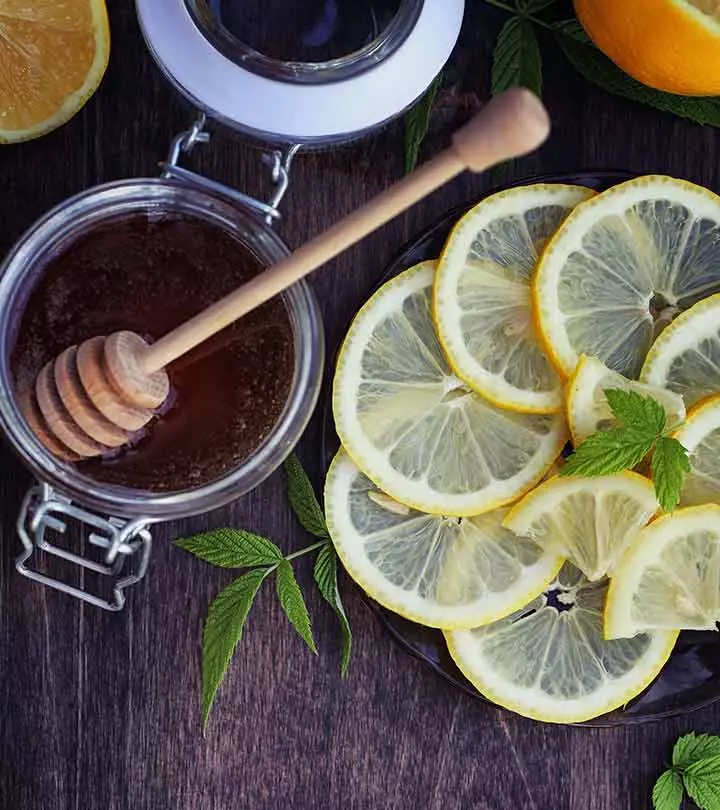


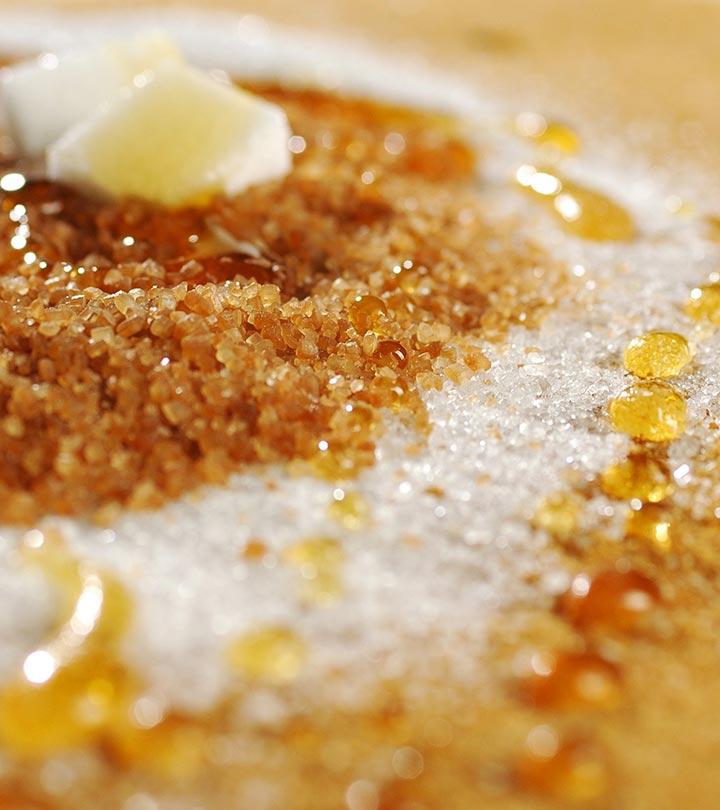
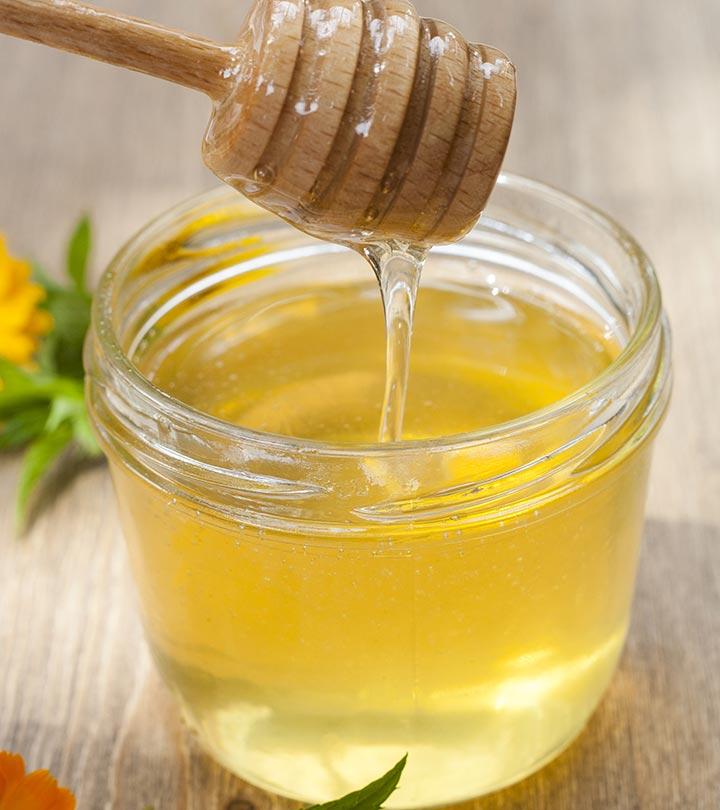









Community Experiences
Join the conversation and become a part of our empowering community! Share your stories, experiences, and insights to connect with other beauty, lifestyle, and health enthusiasts.